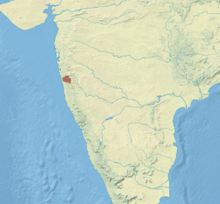Cremnoconchus carinatus
| Cremnoconchus carinatus | |
|---|---|
| Scientific classification | |
| Kingdom: | Animalia |
| Phylum: | Mollusca |
| Class: | Gastropoda |
| (unranked): | clade Caenogastropoda clade Hypsogastropoda clade Littorinimorpha |
| Superfamily: | Littorinoidea |
| Family: | Littorinidae |
| Subfamily: | Lacuninae |
| Genus: | Cremnoconchus |
| Species: | C. carinatus |
| Binomial name | |
| Cremnoconchus carinatus (Layard, 1854)[2] | |
| Synonyms[3] | |
| |
Cremnoconchus carinatus is a species of freshwater snail, an aquatic gastropod mollusk in the family Littorinidae, the winkles or periwinkles.[3]
Distribution

This species is endemic to the Western Ghats range,[2][4] in India.[5]
The type locality for this species is streams in Mahabaleshwar Hills, the Western Ghats range, India.[2] It lives about 4,500 feet (1,400 m) above the sea level.[6]
Description
In 1869 Cremnoconchus carinatus was originally discovered and described from a juvenile shell[6] (under the name Anculotus carinatus) by the English naturalist Edgar Leopold Layard in 1854.[2] Layard's original text (the type description) reads as follows:[2]
| “ |
Anculotus carinatus, Layard. Shell somewhat globose; axis 5 lines, diam. 4 lines. Spire exserted, short. Whorls inflated, rather square, sharply keeled round the inferior angle, minutely longitudinally striated. Colour dull olive, marked faintly with two or three broad bands of dark rufous-brown, which are very apparent in the aperture; columellar lip white, stained with a light dash of the same rufous-brown on the exterior margin. Hab. Streams in the Mahakeshwar Hills, Bombay Presidency. Mus. Cuming. |
” |
In 1869, another English naturalist, William Thomas Blanford, moved this species to the newly created genus Cremnoconchus.[6]
In the adult shell the last whorl is angulate below the suture and at the periphery.[6] The shell is imperforate, ovately conical, with the apex eroded.[6] The width of the shell is 5.5 mm.[6] The height of the shell is 8 mm.[6]
References
This article incorporates public domain text from references[2][6]
- ↑ Madhyastha A. (2013). "Cremnoconchus carinatus". The IUCN Red List of Threatened Species. Version 2014.2. <www.iucnredlist.org>. Downloaded on 15 September 2014.
- 1 2 3 4 5 6 Layard E. L. (1854). "Observations on the Genus Paludomus of Swainson, with Descriptions of several New Species, and the Description of a New Species of Anculotus". Proceedings of the Zoological Society of London (for 1854)22: 87-94. page 94.
- 1 2 WoRMS (2010). Cremnoconchus carinatus (Layard, 1854). Accessed through: World Register of Marine Species at http://www.marinespecies.org/aphia.php?p=taxdetails&id=549387 on 2011-09-05
- ↑ Strong E. E., Gargominy O., Ponder W. F. & Bouchet P. (2008). "Global Diversity of Gastropods (Gastropoda; Mollusca) in Freshwater". Hydrobiologia 595: 149-166. hdl.handle.net doi:10.1007/s10750-007-9012-6
- ↑ (file created 29 July 2010) "FRESH WATER MOLLUSCAN SPECIES IN INDIA". accessed 5 September 2011. 11 pp. PDF.
- 1 2 3 4 5 6 7 8 Blanford W. T. (1869). "Notes on some Indian and Mascarene Land-Shells". Annals and Magazine of Natural History (4)3: 340-344. page 343.
